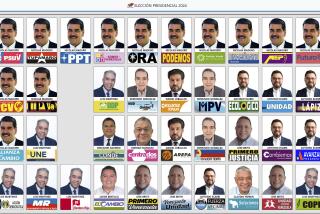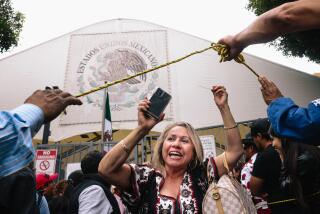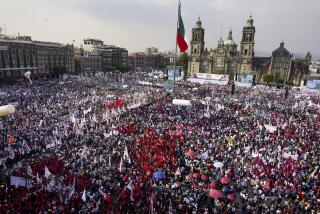Chechens’ Bind: Which Separatist for President?
- Share via
GROZNY, Russia — Shivering in their half-ruined towns and villages, still without running water, phones or jobs after two years of war with Russia, the people of the separatist republic of Chechnya are bewildered by the election posters plastered on the least-damaged walls.
All 16 candidates in the race for a postwar Chechen president, to be elected Jan. 27, are separatists, members of a tightly knit fighting team who have worked together since Russia sent its army into Chechnya in late 1994 in the hope of crushing the independence bid.
The war did not go Moscow’s way, and the humiliated Russians pulled out at the end of 1996 under a peace deal that implicitly accepted the victory of the tiny Chechen fighting force against overwhelming odds. Russia has agreed to decide in five years whether to give the southern republic the full independence for which it fought.
Many Chechens--members of a traditional culture that places great emphasis on consensus, negotiation and respect as a way of avoiding unnecessary conflict--are troubled by the idea of picking a favorite out of the team and, by implication, snubbing the other candidates.
“How can I choose just one of those men as the best president when they’ve all been through fire and they’re all great men?” asked Izmail Visayev, an unemployed Chechen with a family of five who makes ends meet by selling candy and cigarettes from his bedroom window.
If pressed, however, many Chechens will reluctantly admit to private sympathies for one of two candidates. Dozens of people interviewed in markets and on streets here in the capital and across eastern Chechnya made it clear that only these two really count.
They are Shamil Basayev, the most famous of the guerrilla leaders who waged the war, and Aslan Maskhadov, the moderate military commander turned prime minister whose negotiations with Moscow in the autumn brought peace. But these sympathies do not add up to a definite voting choice.
“I don’t think I will vote at all unless the leading candidates join forces and nominate just one person to represent them. My personal sympathies are with Basayev, because I was a fighter myself, but it seems wrong to suggest that he is right and the rest are wrong,” said Maksharip Chadayev, a former separatist fighter now homeless and camping on his brother’s floor in Grozny while he looks for work.
In deference to this widespread anxiety, the five leading candidates have spent weeks discussing choosing just one of them to represent the independent Chechnya they say they all want. But so far, the idea of fielding a single candidate has not borne fruit.
“It would be best if there were a single candidate, but every day I become more convinced that putting forward a single candidate is quite a problem,” said Movladi Udugov, one of the five and Chechnya’s information chief.
Russian officials, smarting at having lost the war and casting about for the best way to win the peace and protect their strategic interests in the republic--mainly an oil pipeline that runs through it--paint the Chechens’ inability to pick a single separatist candidate as an indication of a deep split in the ranks.
They suggest that this will lead to infighting in Grozny, still full of guns after the war, and spread instability throughout southern Russia. Perhaps waiting to counter this threat, the Russian troops who left Chechnya have not gone far. They are camped out in snowy fields less than a day’s drive east and west of the republic, building new bases.
*
The fragile peace has not dispelled old Russian-Chechen suspicions.
Chechen officials are worried that hostile Russian forces--usually said to be semiautonomous groups from the secret services--will try to disrupt the election. They believe such a group killed six foreign Red Cross workers in an attack on a Chechen hospital in December, leading the International Committee of the Red Cross to suspend operations in Chechnya.
On Friday, Maskhadov charged that more such groups are planning armed attacks in border areas before the balloting.
For its part, Russia believes that Chechen separatists are cheating in organizing the election to ensure that anti-Russian extremists win.
About a third of the million-strong Chechens who fled their homes under Russian bombardment now live outside Chechnya, and the republic’s current leaders are not making arrangements for these 300,000 refugees to vote from their new homes. Sulim K. Yunusov of the Central Electoral Commission said that any Chechen who wants to vote must show civic responsibility and come home.
Yevgeny Kiselev, anchorman for a Moscow analytical television program, suggested that excluding these refugees, whose desire for lasting peace might make them favor the moderate Maskhadov, would tip the election unfairly in favor of the anti-Russian Basayev.
Liberal lawmaker Anatoly Shabad is among the Russian politicians voicing concern that no pro-Russians are running for the Chechen presidency. He noted that former Russian parliament Chairman Ruslan I. Khasbulatov, a Chechen, did not register as a candidate, and said that perhaps Khasbulatov was under pressure not to run because his brother was recently kidnapped in Chechnya.
*
Of the candidates who are running, the most palatable choice for Moscow is the peacemaker Maskhadov, a former Soviet army colonel who is versed in Russian ways. He is also the only possible option for voters in moderate northern Chechnya, where a pro-Russian puppet government that has now been disbanded was recruited. About 20% of Chechen voters live in northern areas.
A poll conducted in Grozny last month suggested that Maskhadov would win about 40% of the vote, 20% to 25% would go to Basayev and 12% to 15% for caretaker President Zelimkhan A. Yanderbiyev, viewed as a neutral figure.
Russia’s worst fear is that Basayev will win the election. If he does, all bets as to the future of the peace process are off. Last week, Moscow ruled out any possibility of an amnesty for Basayev.
“Basayev’s victory would mean the complete defeat of plans to restore constitutional order in Chechnya and to prevent the first fracture in the Russian Federation’s territorial integrity,” the mass-circulation daily Moskovsky Komsomolets commented.
To Moscow, Basayev is Public Enemy No. 1, a gun-toting terrorist wanted by the police, reviled by politicians, hated by voters and feared by children for the bloody hostage-taking operation he masterminded at a hospital in the southern Russian town of Budennovsk in June 1995.
But in his homeland, Basayev is a hero. His raid on Budennovsk stopped Russian air attacks on Chechen civilians and forced Moscow briefly into negotiations. Chechens tend to stress that Basayev saved thousands of Chechen lives with the raid, not that it caused the deaths of dozens of Russians. The defiance he represents, while anathema to Russia, is welcomed by the romantics in Chechnya.
Chechnya is still in chaos only a few months after fighting ended. Between 30,000 and 80,000 people were killed during the war. The crime rate--for robberies, thefts, kidnappings and killings--is high. So many people have lost their prewar homes that electoral officials said voter lists for the presidential and parliamentary races will be ready only five days before next Monday’s voting.
Chechnya has refused financial help from Russia to hold elections but has accepted about $350,000 from the Organization for Security and Cooperation in Europe--which helped mediate the peace process--to provide telephones, transportation and technical support for the voting. The OSCE also plans to send about 60 international observers.
More to Read
Sign up for Essential California
The most important California stories and recommendations in your inbox every morning.
You may occasionally receive promotional content from the Los Angeles Times.










